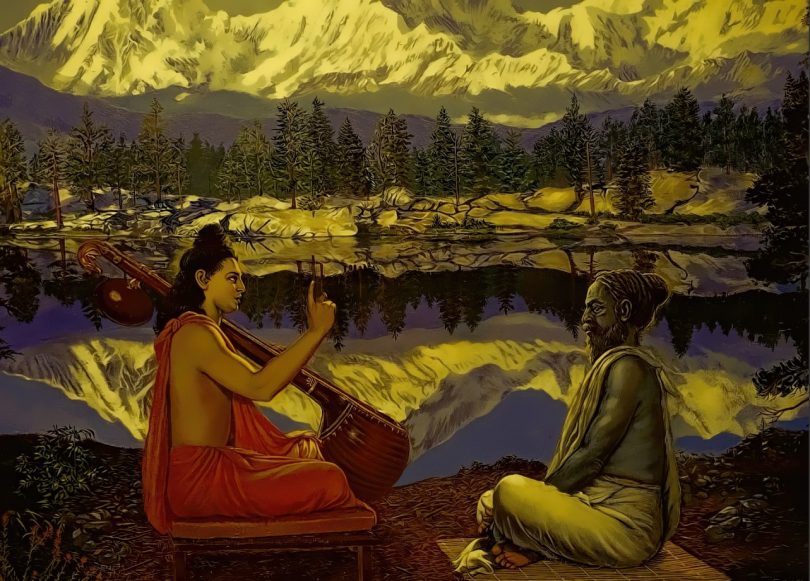Q. Based on the story of Vyasadeva running after his son, Sukadeva Goswami, some people I know argue that Vyasadeva is not perfect and hence the Vedas composed by Him may not be perfect. Please shed some light on this story and how it relates to Vyasadeva’s qualification for writing the Vedas.
Answer by Romapada Swami: This pastime you have mentioned is described in the Bhagavatam itself (please see SB 1.2.2 and 1.4.5 and purport) — it is a wonderful glorification of the transcendental position of Sukadeva Goswami, even at the time of his birth. Great acharyas have explained these verses; here is what Srila Prabhupada writes in the purport to this sloka: “The ladies, by their special qualifications, could sense this at once, and therefore they were not very concerned about him (Sukadeva Goswami). But when his father (Vyasadeva) passed, the ladies quickly dressed. The ladies were exactly like his children or grandchildren, yet they reacted to the presence of Vyasadeva according to the social custom because Srila Vyasadeva played the part of a householder. A householder has to distinguish between a male and female, otherwise he cannot be a householder … Srila Vyasadeva was also in the transcendental stage, but because he was in the householder’s life, he did not pretend to be a liberated soul, as a matter of custom.”
Vyasadeva is an incarnation of the Personality of Godhead; he is playing the role of a householder and thus setting an example for everyone in the ideal behavior of a householder. Sukadeva Goswami’s glorification of being transcendental to bodily distinctions of male and female is very befitting to his position in the renounced order of life. On the other hand, one who is functioning within the society as a grihastha should not artificially pretend to be beyond bodily distinctions – this would only lead to social disturbance and disruption. It is not that the damsels could not appreciate the transcendental character of Vyasadeva, but because he was appearing as a householder, they followed the protocol for that ashram very appropriately. Rather than diminishing his position, this pastime actually highlights the qualities and character of Vyasadeva who, although fully liberated, accepts the position of householder to set an ideal example for common men to follow, just like king Janaka and others did, as stated in BG 3.20-21.
Vyasadeva is accepted as an incarnation of the Supreme Lord; he is confirmed as such by his father Parasura Muni in the Visnu Purana. To set an example (just as Krishna did, by attending the school of Sandipani Muni), Vyasa became disciple of Narada Muni, who extols Vyasa as pure & having perfect vision and appoints him to compose the Srimad Bhagavatam, the cream of all Vedas (SB 1.5.21). Vyasadeva is revered, accepted and followed by all great sages and saintly persons including recent acharyas like Ramanujacharya, Madhvacharya, and Lord Caitanya up to Srila Prabhupada. Indeed, Sukadeva Goswami himself — whom this pastime is meant to glorify — accepted Vyasadeva as his spiritual master and came back to learn the Srimad Bhagavatam from him. He would not have done so if Vyasa was not on an equally transcendental platform. (SB 1.7.8)
So there is no room for any blemish, disqualification or doubts upon Vyasadeva’s authority in presenting the Vedas – at least as it is accepted by all the greatly learned and saintly teachers thus far. We would be most safe in accepting the verdict of these mahajanas and following their footsteps.
The activities of great souls cannot be measured by the mundane yardstick of our mental preconceptions. Only a highly qualified person can rightly understand another great personality. Just as the pastimes of Krishna or Rama, although often misrepresented, can be rightly understood only by hearing in disciplic succession, the same is true of the activities of great devotees. We have to exercise great degree of caution and discretion in trying to understand their activities, and should be careful to draw our conclusions based on hearing from bona fide acharyas or tattva-darshis. Lord Krishna enjoins that in order to learn the truth, one must approach a tattva-darshi, seer of truth, and inquire submissively and render service (BG 4.34) – this is the process of obtaining knowledge of the transcendental dealings of Krishna and His exalted devotees.







